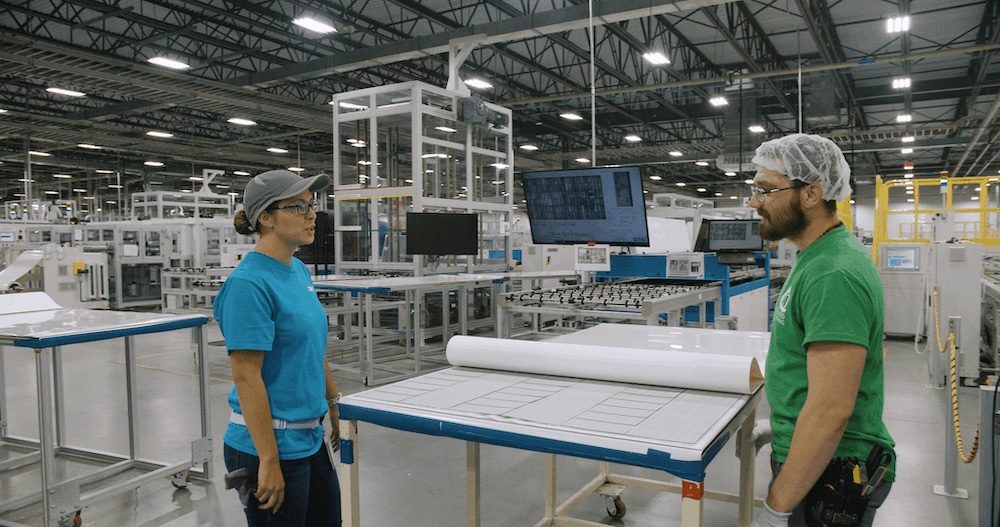Q CELLS Georgia Manufacturing
In 2019, Q CELLS, one of the world’s largest and most recognized photovoltaic manufacturers, opened its first U.S. manufacturing facility in Dalton, Georgia. In this rural area an hour north of Atlanta and 45 minutes from Chattanooga, Tennessee, Q CELLS was attracted by the skilled workforce, extensive manufacturing resources, and Georgia’s excellent transportation infrastructure.

Critically, the Dalton site was also certified by Georgia Ready for Accelerated Development, which identifies areas that are ready for fast-track construction projects. This ensured that Q CELLS could quickly set up shop to tap into the burgeoning U.S. solar market. Construction began in August 2018, and by February 2019 the first round of Q CELLS modules shipped. Today, the 300,000-square-foot facility cranks out 10,000 solar panels daily and has a nameplate annual capacity of 1.7 GW. It is the largest single solar manufacturing site in the Western Hemisphere. Over 650 employees, working across four shifts each day, make the Dalton plant tick. Q CELLS expects to hire another 50 employees, mostly in high-skilled positions, to help the facility soon reach its peak output of 12,000 panels a day.
The Q CELLS facility has played a big role in recharging the community, which was hit hard by the Great Recession and a long-term decrease in manufacturing jobs, says Lisa Nash, Human Resource Manager. Nearly 400 of the operators and technicians hired come from local high schools and technical schools and live within a 30-mile radius of the Dalton plant. The plant has also been a magnet for high-skilled workers, such as engineers, from top colleges and employers across the country. “About 70 percent of the Q CELLS engineers moved to the region from outside the state,” says Nash, “and these are folks buying homes and raising families in the community.”
A majority of the workforce at the Dalton facility fall into three categories: operators, technicians, and engineers. Operators focus on manufacturing the products. Technicians manage the process flow by overseeing the quality and mechanics of the machines. Operator positions need a high school diploma or a technical college degree depending on the level, while technician positions require a technical college or a two-year degree, Nash says. Engineers manage process improvement, quality control, and line efficiency, operations, and assessment.

An engineer position at Q CELLS is a more demanding skill and experience level, requiring a bachelor’s or master’s degree. Many of the experienced engineers come from the automotive and robotics industries, while new engineers typically have an interest or a background in solar, energy, or robotics. Employees work across several core teams. Engineers and technicians oversee manufacturing from both a people and product perspective. They evaluate and test products, machines, operating procedures, personnel training plans, and more, with the goal to reduce waste and increase efficiency.
Initially, Q CELLS had some difficulty finding candidates with the right experience, Nash says, noting that even many of the more experienced job candidates were intimidated by the fast pace, cutting-edge manufacturing process, and advanced technology and robotics. Q CELLS helps new hires acclimate with an on-the-job training program, which can last from two weeks to six months depending on the position. “You don’t have to be an expert in solar or robotics to join the company,” Nash says, “We want people who want to make a difference.”

The number of qualified job candidates has greatly increased over the past year, Nash said. In response to the opportunities at the plant, many local schools have ramped up their STEM programs, and Q CELLS has partnered with local high schools and technical colleges to strengthen candidate pipelines, create robotics training programs, and raise awareness of their work.